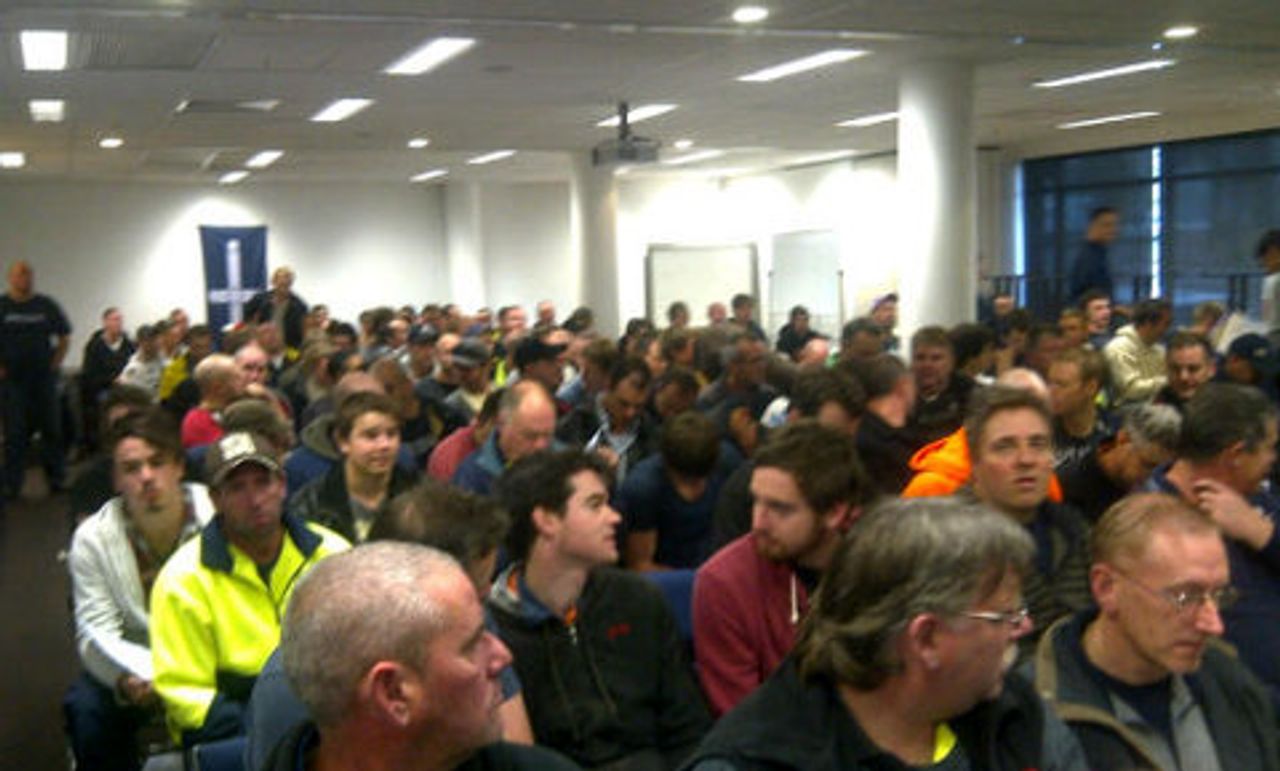Another round of job cuts hit Australian workers this week after the Hastie engineering, electrical and construction group was placed in administration just before midnight on Monday. More than 2,700 of the company’s 4,000-strong workforce is to be axed in the next few weeks.
Hastie, now in the hands of PPB Advisory, is the largest single corporate failure in Australia since the 2008 global financial crisis, with multi-million dollar losses in the past two years. An estimated $500 million is owed to various financiers; the largest debts are with Australia’s four leading banks, ANZ, Commonwealth, National Australia Bank and Westpac.
The company has more than 50 subsidiaries, with over 40 in Australia, and operations in the Middle East, New Zealand, Ireland, the UK and the US where it employs another 3,000 workers. Only 10 of the Hastie subsidiaries are expected to survive. Its failure follows the recent collapse of construction companies Kell & Rigby and St Hilliers Group, with the loss of over 470 full-time jobs and hundreds of contracting positions.
Thousands of Hastie Group electricians, plumbers and other workers were sent SMS messages early Tuesday morning informing them that there were “insufficient funds to maintain operations” and that they were being suspended without pay for 28 days. Others were told outright that their jobs had been axed and given minutes to collect the tools and leave company premises.
 Adam
AdamAdam, a Watters Electrical employee, told the World Socialist Web Site: “We’re heading into a recession here. I’ll have to go to Centrelink and try to get some money until I find a job. I don’t think it’ll be easy. There’s going to be 300 workers here looking for work and another 500 who are going to be coming off the desalination plant [a construction site].
“They say there are jobs in mining, but it’s not that easy. We can’t leave everything behind and go to Western Australia—you might be able to if you’re single, but not if you’ve got family and kids.”
Heyday, another Hastie subsidiary and one the country’s largest electrical and data contractors, is expected to axe about 1,000 jobs across New South Wales, the Australian Capital Territory, Queensland and Victoria. An estimated 300 jobs will also be destroyed at Hastie’s air conditioning division. Those on 28-day suspension cannot access any outstanding entitlements during that period or claim unemployment assistance.
Last December, Hastie announced a $150 million loss and earlier this month revealed that its first-half earnings for 2012 would be reduced to zero. The company nevertheless assured its workers, as recently as two weeks ago in some cases, that their jobs were safe.
Officials from the Electrical Trades Union (ETU), the Australian Manufacturing Workers’ Union (AMWU) and the Communications, Electrical and Plumbing Union (CEPU), which cover most of the Hastie workforce, obviously knew the real financial state of the company but kept their mouths’ shut about these bogus assurances.
Just as they have done with the job cuts now hitting workers in the building, manufacturing, retail and other sectors across Australia, the minority Gillard Labor government and the unions immediately responded to assist administrators of the bankrupt company implement its job cuts.
Federal Minister for Employment and Workplace Relations Bill Shorten issued the usual perfunctory and false declarations that the Labor government was “saddened” by the job cuts and would “do all it could” to assist displaced workers. In fact, the Labor government is playing a central role in orchestrating the wholesale restructuring of industry that is producing an avalanche of job losses.
The unions immediately went into action to ensure that workers in the various Hastie subsidiaries were kept separated while urging them to demand redundancy pay outs. No combined union mass meetings were called. The unions are utterly opposed to any struggle to defend jobs. Instead, officials were mobilised to tell workers that the unions would further collaborate with PPB Advisory administrators to orchestrate the layoffs while ensuring existing site projects would be completed.
The response of the ETU in Victoria, where over 1,000 Hastie jobs will be axed, was typical. ETU state secretary Dean Mighell flew to Canberra on Monday, met with Employment Minister Shorten, and then threatened to take legal action against Hastie subsidiary Watter Electrical in the Fair Work Australia tribunal to immediately make 300 Watter Electrical employees redundant.
 A section of Melbourne ETU mass meeting
A section of Melbourne ETU mass meetingAddressing a mass meeting of Watter Electrical ETU members in Melbourne the next day, Mighell claimed that Shorten was “very, very supportive” and workers would be successfully re-employed by other companies.
This rhetoric was combined with a chauvinist denunciation of the Labor government for granting special work permits to 1,700 foreign workers on a new mining project. “I said to them [the Labor government], try explaining, to the blokes I’m going to be standing in front of tomorrow morning, why you are importing 1,700 skilled workers into this country … why it’s OK for you to bring in foreign skilled labour,” he declared.
Mighell comments are a provocative diversion, aimed at deflecting attention from the treacherous role of the unions, which have worked day and night to ensure that the massive job cuts at Hastie are imposed.
Since the 2008 global financial crash, more than 130,000 jobs have been destroyed in the Australian manufacturing sector alone. In every instance, the unions have worked to enforce the corporate restructuring demands, delivering “orderly closures” and sabotaging any move by workers to defend jobs. The direct and active involvement of the unions in the destruction of 2,700 jobs at Hastie makes clear that this social assault can only be defeated if workers begin organising independently and in opposition to the Labor government and the unions.
What is required is a political rebellion against union and Labor bureaucracies and their big business program and the development of an independent struggle to defend every Hastie workers’ job. Suspended Hastie employees should establish rank and file committees to develop and coordinate occupations of company facilities and worksites nationwide. The company books must be open to all and fully investigated by experts trusted and appointed by Hastie workers.
Hastie workers should turn out to other sections of the working class in Australia and internationally who are confronting similar attacks on their jobs and conditions. The defence of jobs can only be developed as part of a broad-based movement fighting for a workers’ government based on a socialist program that takes control of the construction industry, finance and key sectors and places them under the democratic ownership and control of the working class.
